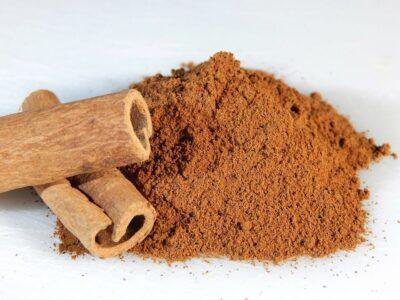What do you think of when you smell cinnamon? For many of us, the powerful spice’s aroma brings back memories of holidays or cozy winter nights by the fireplace. Or, maybe your grandma treated you to cinnamon rolls or toast sprinkled with cinnamon and sugar.
However, cinnamon does much more than just taste and smell good. It offers many health benefits. In fact, cinnamon has been used for medicinal purposes since ancient times.
Cinnamon comes from inner bark of the cinnamomum tree. Its distinctive smell and flavor is due to the oily part of the bark, which is high in a compound called cinnamaldehyde. The bark also contains other healing properties, including cinnamic acid and cinnamate.
When the bark dries, it forms strips that curl into rolls, which we call cinnamon sticks. These sticks can be ground into a spice powder, or the compounds can be isolated as an essential oil.
The All-Natural Pain Relief With No Nasty Side Effects!
Ancient civilizations considered cinnamon to be a gift fit for a king. Today, it is one of the healthiest spices you can find in your grocery store. Here are 10 health benefits cinnamon can offer.
1. Antioxidants. Cinnamon is loaded with antioxidants known as polyphenols, phenolic acid and flavonoids. These compounds, which are also found in dark berries, red wine and dark chocolate, work to reduce free radical damage in the body and can slow the aging process. In terms of its antioxidant content, cinnamon outranks many superfoods including garlic, oregano, rosemary and thyme.
2. Anti-inflammatory effects. These antioxidants in cinnamon work to reduce inflammation in the human body. Scientists believe that the consumption of cinnamon can help the body reduce swelling, repair tissue damage, relieve muscle soreness and lower allergic reactions.
3. Heart health. Consuming cinnamon can help reduce your LDL (or “bad”) cholesterol, while keeping your HDL (“good”) cholesterol stable.
High blood pressure is related with the risk of stroke and heart disease, and, in several animal studies, cinnamon consumption has reduced blood pressure.
Additionally, cinnamon works as a blood coagulant and can help the body form blood clots. It also helps the body maintain proper blood circulation.
4. Diabetes. Another benefit of cinnamon is its ability to help lower blood sugar levels and improve sensitivity to the hormone insulin, which is needed to balance the body’s blood sugar levels.
Promising human research studies trials have demonstrated that that a daily dose of 1-6 grams of cinnamon (0.5-2 teaspoons) can lower fasting blood sugar levels by as much as 10 to 29 percent.
5. Brain function. Cinnamon’s antioxidant properties also may benefit cognitive function and overall brain health, offering protection form neurological disorders, including Parkinson’s disease and Alzheimer’s disease.
In animal studies, cinnamon reduces the negative effects of oxidative stress by blocking cells from morphing and/or self-destructing. The spice contains certain neuro-protective proteins that protect brain cells from mutating and undergoing damage.
6. Cancer protection. The compound cinnamaldehyde found in cinnamon may help the body fight tumor growth, DNA damage and cell mutation. This benefit shows especially promising results in colon cancer research. Animal studies and test tube studies of human cells show that cinnamon activates certain protective responses in colon cells.
7. Infections and viruses. The cinnamaldehyde in the spice also may help fight various kinds of infection. Studies have shown cinnamon oil to be effective in treating respiratory tract infections caused by fungi, and it can help inhibit the growth of certain dangerous bacteria, such as listeria and salmonella.
More human trials are needed, but laboratory studies have demonstrated that cinnamon may fight the HIV virus.
8. Dental health. Have you noticed cinnamon as an ingredient in many toothpaste brands? Cinnamon is a natural way of killing the microflora that can lead to tooth decay, mouth infections and bad breath. With its pleasant taste and smell, cinnamon has been used effectively for centuries to treat toothaches and as a mouthwash ingredient.
9. Candida yeast levels. The anti-fungal properties in cinnamon can help lower the amount of dangerous candida albicans in the digestive tract. Overgrowth of Candida can lead to digestive and autoimmune symptoms. Cinnamon fights candida naturally by boosting overall immune health and fighting inflammation within the gut.
10. Healthy skin. Cinnamon’s anti-microbial and antibiotic properties also can help protect the skin from rashes, allergic reactions and infections. Cinnamon and honey – another natural healer — are a successful combination to treat acne, rosacea and signs of skin allergies.
As a natural sweetener, cinnamon contains no sugar and very few calories. Therefore, it can be healthy replacement for sugar in many of your favorite beverages and recipes.
Unfortunately, not all cinnamons on the market offer the same health advantages, and many supermarkets only offer the less expensive “cassia” variety. Be sure to look for the “ceylon” variety, also known as “true cinnamon,” for the most nutritional benefits.
How do you use cinnamon for health? Share your tips in the section below:
Sources:
https://www.ncbi.nlm.nih.gov/pmc/articles/PMC4003790/
https://www.researchgate.net/publication/232138906_Cinnamon_Overview_of_Health_Benefits
https://time.com/4751426/why-cinnamon-is-insanely-good-for-you/
https://www.diabetesaction.org/site/PageServer?pagename=complementary_july_06
https://www.pbrc.edu/training-and-education/pdf/pns/PNS_Cinnamon.pdf
 Off The Grid News Better Ideas For Off The Grid Living
Off The Grid News Better Ideas For Off The Grid Living





